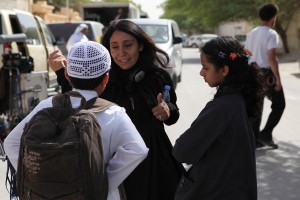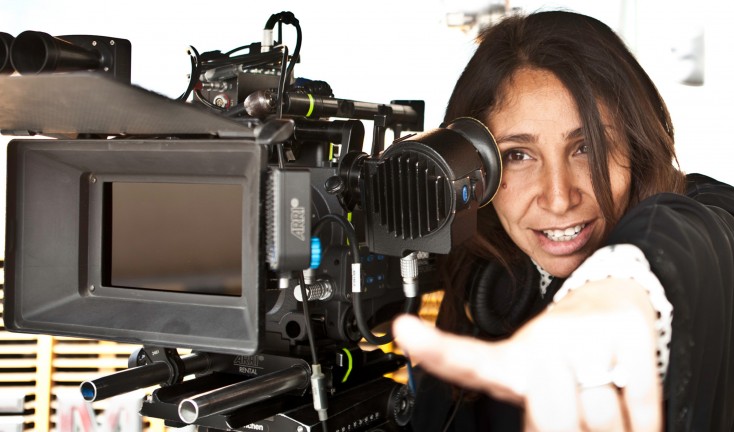
(l-r) Abdullrahman Al Gohani, Director Haifaa Al Manour and Waad Mohammed on set of “Wadjda.” ©Razor Films. CR: Tobias Kownatzki.
By ANGELA DAWSON
Front Row Features
HOLLYWOOD—Haifaa Al Mansour is a trailblazer.
Born in Saudi Arabia, a country that doesn’t allow public movie theaters, she has the distinction of being the first director—and the first female—to make a feature film entirely in that country. Her film has been selected as the official entry from that prosperous and socially conservative country to the Academy of Motion Pictures Arts & Sciences for consideration in the best foreign language film category at the upcoming Academy Awards.
The film is called “Wadjda,” and it is about a 10-year-old Saudi girl (played by newcomer Waad Mohammed) who dreams of owning a bicycle which, up until recently, was forbidden in that society. The Saudi Arabia entry is one of two from countries that have never before submitted entries into the film competition. (The other is Moldova.)
The eighth of 12 children, Al Mansour revealed a creative streak early on, writing plays performed by her classmates at her all-girls school. The plays were rudimentary, with moral themes that would pass muster with her strict teachers. She also injected those early works with humor and grounded them in reality.
Some of “Wadjda,” her first feature-length film, is based on her own experience growing up in a very conservative society where women must cover up in public and are should not be heard by men.
The married mother of two young children spoke recently about filming in her native land and some of the hurdles she had to overcome make it.
Q: What was the process getting this film made?
Al Mansour: I come from a country with an oral tradition so writing a script was very intimidating for me. I didn’t know much about structure and what do so I enrolled in a Master’s program just to write this. The first draft wasn’t very good. It wasn’t my ideology and it didn’t have what I wanted to say about the world. It didn’t have what I wanted to say about women in Saudi Arabia. Then, I went to the Berlin Film Festival, and I was in the script station with my script, and I saw a film that is very similar—it was set in a conservative place, and the girl’s a victim, and it was more about the world she’s from and it was dark and bleak and sad and all that. It was an empowering film, a feminist film and all that, but I did not feel a thing. I always felt the director’s presence. It didn’t touch me. And the other thing I thought is that it is exactly like my script! (She laughs.) I said I’m not going to make this film again. So I went back home and started to give life to the story. The character of Wadjda is based on my niece. The mother is based on somebody I know. And that is my school. So I started building the world that I lived in. I had a lot of fun injecting life into it. So, yeah, writing was very challenging for me, and having the structure right. I’m very thankful for Sundance Writer’s Lab. They set me off on the right path. It’s very important to have support.
Q: How did you finance it?
Al Mansour: Financing was difficult. Where I come from is very rich. A lot of people with an organization were spending money on a lot of other projects—and this was a small project, and yet they would fund it. They didn’t believe in a simple story about a happy girl who wants to conquer the world on a bicycle. They felt that theme would not work in the Arab world. That is, until Rotana (the Arab world’s largest entertainment company), came in and it was co-produced with Razor Film (a German production company). We decided to go to Saudi, and it’s such a conservative place. There is a little bit of infrastructure for TV, and that’s what we used. But the culture itself is conservative and resistant when it comes to film. We were going against the current sort of. And access to locations was very difficult. People would tell us just a few hours before that we couldn’t shoot there. We had already planned it. Saudis are also segregated, so for the exterior scenes I had to (direct) from inside a van, because I’m not supposed to mix with men.
Q: Did you have to come up with an alternative location on the spot?
Al Mansour: Exactly. Like we had the mall and then when we showed up to shoot there, they told us we had to find another mall in a few hours. We found it. And we also had to make time for prayers. They said we had to finish before the next prayers started. So that gave us two hours to do everything, and we did. All of a sudden we had a Starbucks in the background, and we couldn’t show it because we were using public funds from Germany so we couldn’t show brands. So we had a salesman holding balloons to obstruct the signage the whole time we were shooting.
Q: Was it difficult to cast this?
Al Mansour: All our female actresses have done TV. Reem Abdullah, who plays the mother, is a very famous TV star. Finding the young girls was difficult. I had to audition a lot of girls. We couldn’t have an open casting call so we relied on word of mouth. It was like fishing. We set up auditions at hotels, and waited to see who came. We found amazing girls that were beautiful and with a lot of charisma. They’d come and audition and then they’d go home and change their minds. It was sad to see that they were afraid. It was heartbreaking. Then Waad Mohammed came in late in the auditioning process. She was carefree and I think she inhabited the character really well. She thought it was a cool character so she started becoming like (Wadjda). I thought it was really empowering that she was emulating the role. Wadjda is a positive role model. She’s a girl that will never give up. She is someone who doesn’t care that she’s from Saudi Arabia. If she wants something, she’ll set her mind to getting it. It is important not to stop at obstacles, especially in Saudi Arabia and the Middle East, because there are so many, so it’s very important to concentrate on what we can do.
Q: Since there are no public movie theaters, how will Saudis see this film?
Al Mansour: On DVD. We did some screenings as a cultural experience. But it was only for 10 days. A theatrical release in Saudi Arabia is not going to happen. Not yet. But we are planning on releasing the film in liberal countries like Dubai, Bahrain, Kuwait and Qater, where a lot of Saudis travel.
Q: What sparked your interest in filmmaking?
Al Mansour: I loved film when I was little. I remember watching “Snow White,” and all those animated films. I never thought I’d be a filmmaker. After I finished my bachelor’s degree in Egypt, I started working back home in Saudi. It was in the early 2000s. It was a very difficult time for women in the workplace and I was ambitious. I wanted to have a voice and voice so I made a short (film) and I sent it to a competition in Abu Dhabi, and got accepted. They said I was the first female from Saudi Arabia to submit it. It gave me a voice and a sense of self-assurance that I lacked.
Q: You’ve made three short films, a documentary and now this. Congratulations on this being the first feature film entered into the Academy Awards competition for best foreign language film. When did you get the news and how did you feel when you heard?
Al Mansour: I’m so honored; I couldn’t believe it. It’s amazing to see an acknowledgement of this art form of a film coming from Saudi Arabia. I feel very honored that they nominated (“Wadjda”). It’s a very exciting time in Saudi Arabia. It’s a changing society and there’s room for art and for women, but we still have to work within the framework. I called my mom to tell her the news. I didn’t want her to hear it from someone else. I told her, “My film’s been submitted to the Oscars,” and she said, “What’s the Oscars?” I told her it’s a big competition. It’s a good thing!” Then she told all her friends. She’s proud of me and she enjoyed the film. But I believe my sisters could relate to this more. It’s about their generation. My sisters are veiled and all that. They’re typical Saudis.
Q: What would you like to do next?
Al Mansour: I want to grow as an artist. I would love to work (in the U.S.) if there are opportunities. What an amazing place to work? I just want to be a working artist. I want to tell stories back in Saudi, and I’m working again with Razor and Rotana. I think Saudi Arabia is an amazing place to tell stories but I also want to expand and continue working. I love the creative process so I hope to continue making films.
Q: Have you thought what it would be like to walk the red carpet at the Oscars?
Al Mansour: I can’t even dream about that.



